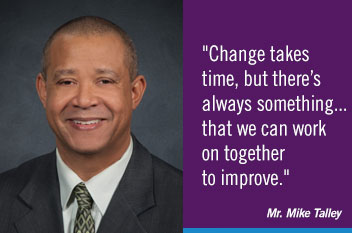Helping Primary Care Teams Rediscover the Joy of Medicine
 A former military intelligence officer and undercover policeman, Mr. Mike Talley seems an unlikely candidate to coach primary care practices on ways to improve care. But by adding a master's degree in counseling and on-the-ground experience assisting clinics with medical administration, he makes an ideal detective to help practices get to the root of quality improvement challenges.
A former military intelligence officer and undercover policeman, Mr. Mike Talley seems an unlikely candidate to coach primary care practices on ways to improve care. But by adding a master's degree in counseling and on-the-ground experience assisting clinics with medical administration, he makes an ideal detective to help practices get to the root of quality improvement challenges.
"One size doesn't fit all," Mike says as he describes his job as a practice facilitator with Health Quality Innovators, part of the EvidenceNOW cooperative working in Virginia. "With each practice, you have to go in and look, listen, and observe."
A recurring issue Mike sees in his work is staff burnout. In some cases, helping practices reduce burnout can involve analyzing staff's core duties to determine if team members are shouldering extra tasks. Other practices require more extensive solutions to help clinicians keep up with the volume and pace of their work. At one participating practice, a doctor was showing signs of stress. "She had only been on the clinic floor eight months, and she was already burned out," said Mike, who realized that the clinician's most immediate source of stress would need to be resolved before work could begin on improving heart health services at the practice.
Mike learned that the doctor was being bombarded by email messages. She was working around the clock to manage them on top of her full days seeing patients. Mike helped the practice test and implement a message prioritization system as one possible solution. Messages requesting a medical appointment could be answered by the administrative staff. Medication questions that could be answered by referencing the patient's medical record could be handled by the nurses and medical assistants. Messages from a clinician outside of the practice who was treating a patient had to be answered by the doctor.
This system helped alleviate 54 percent of the doctor's message load. From there, she was able to shift gears with Mike and the practice staff to work on more complex areas, such as optimizing use of their electronic health record system to better track patients' blood pressure readings and follow-up appointments.
Strategies Mike shares with practices through EvidenceNOW help primary care staff rediscover what they enjoy about practicing medicine and provide patients with better care. He recognizes that some practices are interested in quality improvement but may not feel like they have the bandwidth for it. "Change takes time," Mike says, "but there's always something—big or small—that we can work on together to improve."
This story is courtesy of Heart of Virginia Healthcare, the EvidenceNOW Virginia Cooperative.



